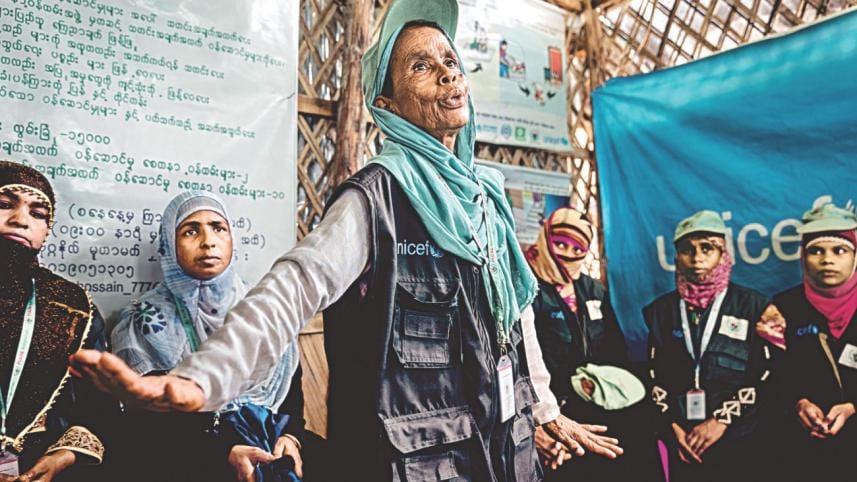Lifesaving Messages Challenge The Camp Rumour Mill

Balukhali camp: In the narrow paths and alleyways that thread past the homes of nearly one million Rohingya refugees, there's nothing that spreads quite as quickly as rumours. With little or no access to television, radio, or other media, the refugees have to rely largely on word of mouth to keep informed not just about what is happening in the camp, but about issues critical to their health, nutrition and even survival.
Immunisation – something few Rohingya experienced back home – is one topic that has caused fevered and sometimes ill- informed discussion. One story had it that measles injections would make girls sterile. Another claimed a vaccination would convert a child into a Christian.
It is to help tackle such dangerous misconceptions, and to make the refugees more aware of the positive value of the services set up for them, that “model mothers” such as Nur Begum have been recruited.
This charismatic 50-year-old mother and grandmother - herself a Rohingya - is among some 240 volunteers (hired by UNICEF partner Pulse) whose job is to go house-to-house around the camp, engaging women and girls on a range of sometimes sensitive issues.
Young expectant mothers are among Nur's prime interlocuters. “I tell them that they must call a midwife when they are about to give birth, because she will help them if they have difficulties,” she says. “Likewise I tell young mothers that breastfeeding helps to keep a baby healthy.”
Personal cleanliness is another topic that she vigorously promotes. “Most people living here are unaware of basic hygiene. I tell them that a clean house is a house free of the possibility of infections and diseases,” she declares.

The model mothers and youth volunteers, along with 800 community mobilization volunteers recruited by another UNICEF partner, BRAC, are among the more effective means of reaching the refugees with culturally sensitive and accurate information, helping them cope with the fast-changing context of life in the camps.
Because they are from the Rohingya community, they surmount a major language issue (especially as the Rohingyas' own language has no written form, and literacy rates, in any case, are low).
In addition, adolescent radio listener groups give young Rohingya refugees an opportunity to engage on issues affecting them, their families and wider communities.
“Rumours spread like wildfire, and can have a serious impact on our programmes, and on immunization especially,” says UNICEF Communication for Development Specialist, Aarunima Bhatnagar. “Besides the volunteers, we engage local imams and community leaders (known as Majhis). We have also set up a network of 12 information and feedback centres around the camps to ensure consistent messages are disseminated, and to encourage community participation.”
In a conservative society, messages on some issues -- such as early marriage – are not always readily received. Many families tend to take the view that under Islamic law, it is acceptable for girls from age 13 upwards to get married even though this is officially prohibited by the Government of Bangladesh.
Nur Begum is undeterred. “One of the biggest problems I face is that of parents who want their children to marry when they're too young – in some cases aged only 13 or 14,” she says. “I tell them they must be aged 18 or over and there can be no exceptions.”



Comments